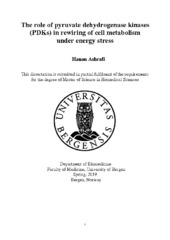| dc.description.abstract | Irregularities in cellular energy metabolism have been linked to many human diseases, including metabolic disorders, mitochondrial diseases, cancer, and neurodegeneration. In order to survive and function properly, an adequate supply of energy is necessary. When cells are exposed to energy stress or pathologic stimuli, they have the ability counteract decreased energy status by activating adaptive mechanisms, which can theoretically be referred as metabolic rewiring. More scientific knowledge about the molecular mechanisms involved in metabolic rewiring may facilitate development of new targeted therapeutic strategies. In this study, we investigated the effects of genetic manipulation and the mechanisms of metabolic adaptation in cultured cells, and how these correlates with changes in key metabolic and physiological functions under different conditions of energy stress. We particularly mimicked pyruvate dehydrogenase (PDH) dysregulation in MDA-MB-231 cell line by inducing overexpression of all four isoforms of pyruvate dehydrogenase kinase (PDK1-4). Successful overexpression of each of the PDK isoforms was confirmed by quantitative real-time PCR and western blot analysis. We found that increased PDK1-4 expression is associated with increased proliferation in modified MDA-MB-231 cells, particularly in PDK1, PDK3, and PDK4 overexpressing cells. We carried out a series of cell proliferation assays in high (25 mM), moderate (5 mM) and low (1 mM) glucose to investigate the effect of glucose supply on growth of PDK-overexpressing cells. We observed that PDK1-4 overexpression triggers a reduced cellular tolerance in glucose deprived condition and conversely, they exhibited an increased dependence on high glucose. Besides, Inhibition of PDK by Dichloroacetate (DCA) was found to cause a drastic reduction in proliferation in these cells. Subsequent metabolic adaptation was observed towards increased mitochondrial respiration and glycolysis in the PDK-overexpressing cells, mostly in the PDK1 expressing cell. However, pyruvate oxidation was reduced by PDK overexpression, as expected. One remarkable finding of this study is PDK-overexpression was found to trigger a metabolic switch towards increased fatty acid oxidation. In cells overexpressing PDK1 or PDK2, fatty acid oxidation was increased in low glucose condition, whereas in PDK3 or PDK4 overexpressing cells, fatty acid oxidation was increased in high glucose condition. Our findings suggest that PDK overexpression is associated with subsequent metabolic rewiring in cultured cells, characterized by increased dependency of glucose for growth, changed utilization of energy substrates, and increased rates of both glycolysis and mitochondrial respiration. | en_US |
